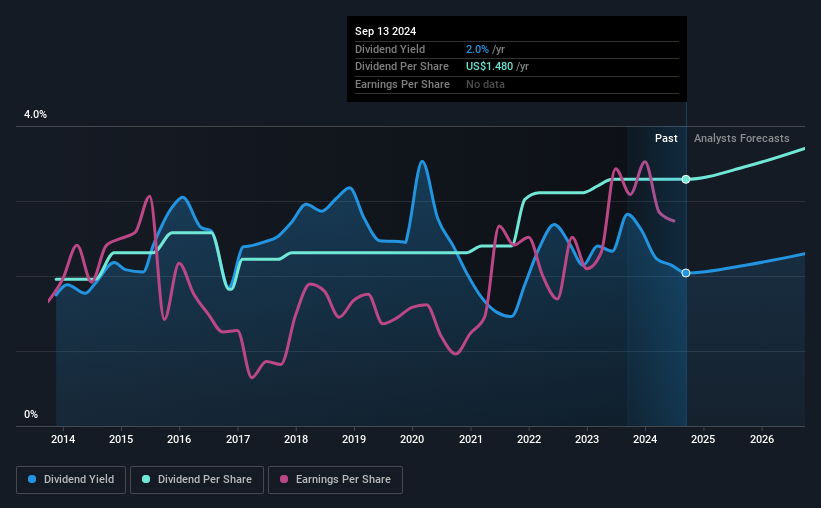- United States
- /
- Building
- /
- NYSE:JCI
Johnson Controls International (NYSE:JCI) Has Affirmed Its Dividend Of $0.37

Johnson Controls International plc's (NYSE:JCI) investors are due to receive a payment of $0.37 per share on 18th of October. This makes the dividend yield 2.0%, which will augment investor returns quite nicely.
Check out our latest analysis for Johnson Controls International
Johnson Controls International's Future Dividend Projections Appear Well Covered By Earnings
While it is great to have a strong dividend yield, we should also consider whether the payment is sustainable. The last dividend was quite easily covered by Johnson Controls International's earnings. This indicates that a lot of the earnings are being reinvested into the business, with the aim of fueling growth.
The next year is set to see EPS grow by 113.9%. If the dividend continues on this path, the payout ratio could be 30% by next year, which we think can be pretty sustainable going forward.

Dividend Volatility
Although the company has a long dividend history, it has been cut at least once in the last 10 years. Since 2014, the annual payment back then was $0.88, compared to the most recent full-year payment of $1.48. This implies that the company grew its distributions at a yearly rate of about 5.3% over that duration. We have seen cuts in the past, so while the growth looks promising we would be a little bit cautious about its track record.
The Dividend Looks Likely To Grow
With a relatively unstable dividend, it's even more important to evaluate if earnings per share is growing, which could point to a growing dividend in the future. It's encouraging to see that Johnson Controls International has been growing its earnings per share at 15% a year over the past five years. The company is paying a reasonable amount of earnings to shareholders, and is growing earnings at a decent rate so we think it could be a decent dividend stock.
We Really Like Johnson Controls International's Dividend
Overall, we like to see the dividend staying consistent, and we think Johnson Controls International might even raise payments in the future. Earnings are easily covering distributions, and the company is generating plenty of cash. All of these factors considered, we think this has solid potential as a dividend stock.
Investors generally tend to favour companies with a consistent, stable dividend policy as opposed to those operating an irregular one. Still, investors need to consider a host of other factors, apart from dividend payments, when analysing a company. To that end, Johnson Controls International has 4 warning signs (and 1 which is significant) we think you should know about. If you are a dividend investor, you might also want to look at our curated list of high yield dividend stocks.
New: Manage All Your Stock Portfolios in One Place
We've created the ultimate portfolio companion for stock investors, and it's free.
• Connect an unlimited number of Portfolios and see your total in one currency
• Be alerted to new Warning Signs or Risks via email or mobile
• Track the Fair Value of your stocks
Have feedback on this article? Concerned about the content? Get in touch with us directly. Alternatively, email editorial-team (at) simplywallst.com.
This article by Simply Wall St is general in nature. We provide commentary based on historical data and analyst forecasts only using an unbiased methodology and our articles are not intended to be financial advice. It does not constitute a recommendation to buy or sell any stock, and does not take account of your objectives, or your financial situation. We aim to bring you long-term focused analysis driven by fundamental data. Note that our analysis may not factor in the latest price-sensitive company announcements or qualitative material. Simply Wall St has no position in any stocks mentioned.
About NYSE:JCI
Johnson Controls International
Engages in engineering, manufacturing, commissioning, and retrofitting building products and systems in the United States, Europe, the Asia Pacific, and internationally.
Average dividend payer slight.
Similar Companies
Market Insights
Community Narratives




